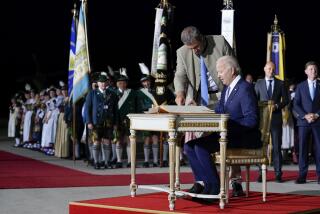5 Nations Reportedly Agree to Talks on Dollar Stability
- Share via
WASHINGTON — Finance officials from five major industrial nations have agreed to meet this weekend in Paris in a bid to stabilize the dollar, international monetary sources said Wednesday night.
The high-level meeting would represent the culmination of a long series of behind-the-scenes negotiations aimed at reducing trade imbalances among the major powers and preventing a further rapid decline in the value of the U.S. currency.
Under the plan being discussed by the so-called Group of Five, sources said, West Germany and Japan would agree to stimulate their own economies in return for an agreement from the United States to help intervene in currency markets to halt any major deterioration in the value of the dollar. The other two members of the finance group--Great Britain and France--would also participate in the agreement.
U.S. officials would neither confirm nor deny reports of the impending meeting.
The Reagan Administration has been prodding West Germany to move more quickly to cut taxes in an effort to stimulate its lagging economy, while encouraging Japan to lower interest rates to help boost domestic growth. Such moves would help reduce the gaping U.S. trade deficit by boosting American exports and reducing the pressure on foreign manufacturers to export to the United States because of weak demand at home for their own goods.
Meanwhile, Treasury Secretary James A. Baker III has offered in private negotiations, monetary sources disclosed last week, to establish broad “reference ranges”--upper and lower limits for the dollar, the West German mark and the Japanese yen--to ease fears of foreign officials that a further weakening of the dollar would squeeze their exporters so hard that it could push their nations into a recession.
But it was unclear Wednesday night whether formal target zones for major currencies would be part of the agreement, or whether the leading powers would establish a more informal system for stabilizing their currencies.
Ambiguous Statements
Foreign governments expect, though, to extract a concession from the Reagan Administration to put an end to a series of ambiguous statements from top officials that have encouraged the recent declines in the dollar.
Federal Reserve Chairman Paul A. Volcker has also expressed fears over the impact of a collapse in the dollar, pointing out that it might require the central bank to boost interest rates sharply to prevent foreign investors from shifting to other currencies away from their massive U.S. investments that have helped finance the nation’s large budget deficits.
The Reagan Administration also hopes that the meeting, if successful in helping to bring down the record $170-billion U.S. trade deficit, would aid in blocking Congress from approving protectionist trade legislation.
Negotiations in Progress
Negotiations among the five major industrial powers have been under way for several weeks, but the Reagan Administration refused to schedule a high-level meeting until it was sure such a session would produce some useful results.
Baker acknowledged in a television interview last week that discussions about a meeting were under way but said it had not been agreed to at that time. “You shouldn’t hold a meeting that you don’t think is going to be successful,” he said.
Baker and Volcker would represent the United States at the Paris meeting Saturday with their counterparts from the other four top industrial nations. On Sunday, the five nations would also be joined by Canada and Italy for a Group of Seven meeting of finance ministers only.
Meanwhile, a Japanese news agency, Kyodo News Service, reported from Washington that Baker and Japanese Finance Minister Kiichi Miyazawa have agreed to establish a “rough target” of 150 to 160 yen to the dollar, but Treasury officials refused comment on the Kyodo report, and Baker told reporters in New York on Wednesday: “I never believe everything I read in the papers.”
Dollar Closes Higher
In currency trading Wednesday, the dollar closed higher, but many traders remained on the sidelines ahead of key congressional testimony scheduled today by Volcker and Baker.
The dollar closed at 1.8340 West German marks, up more than two pfennigs from 1.8195 marks at Tuesday’s close. It was also higher against the Japanese yen, at 153.90 yen from 153.40 yen at the previous close.
Heightened speculation that the Group of Five leading industrial nations might be preparing to meet soon also supported the dollar, traders said.
The dollar was also aided by Baker’s remark in a New York luncheon speech that exchange rates alone cannot correct trade imbalances.
Tom Redburn reported from Washington and Sam Jameson from Tokyo.
More to Read
Sign up for Essential California
The most important California stories and recommendations in your inbox every morning.
You may occasionally receive promotional content from the Los Angeles Times.













